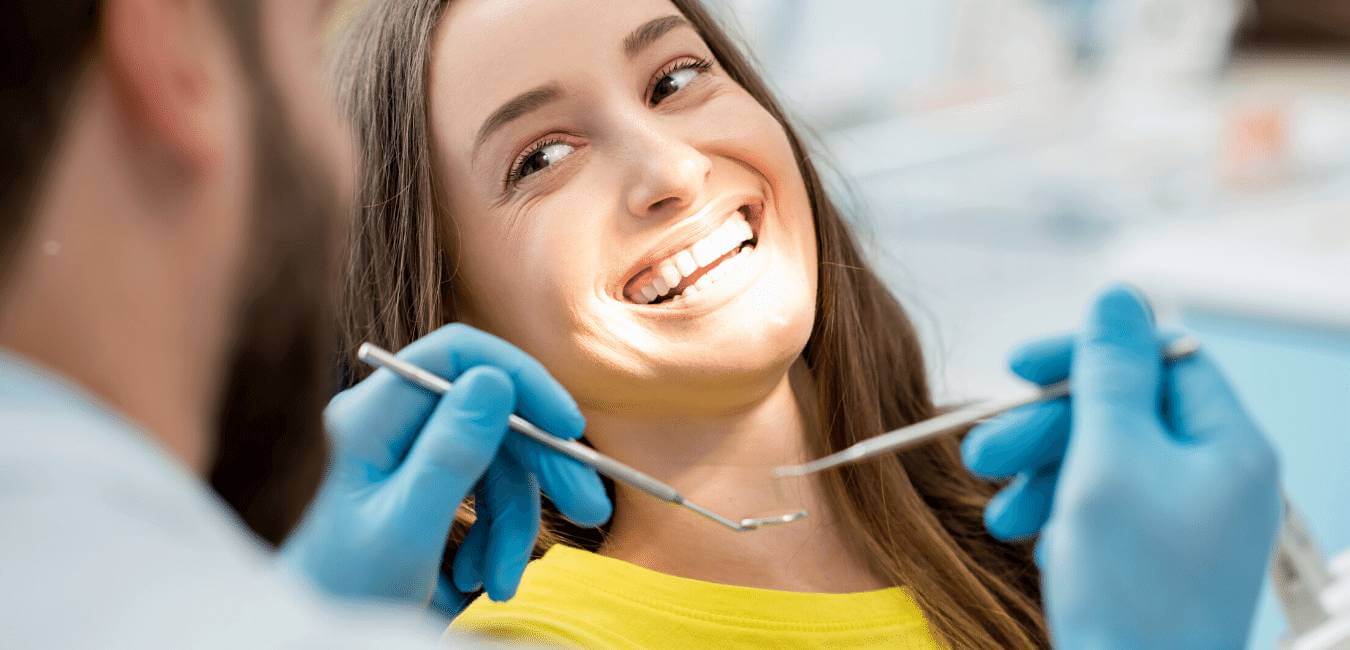A dental checkup is a routine appointment with a dentist that evaluates and maintains oral health. These appointments usually involve a thorough teeth, mouth, and gums exam. They may also include dental cleanings and X-rays. The dentist will check for signs such as decay, cavities, and other damage on the teeth, as well checking the gums for symptoms like inflammation, bleeding, or infection. The dentist may also examine the jaw, bite and look for abnormalities. Most people should have a dental checkup every six months, but the frequency can vary depending on each individual’s oral needs. Regular dental checkups are important to maintain good oral health, prevent problems, and detect issues early when they can be treated more easily. Patients can also ask questions and get oral health and proper hygiene guidance. Everyone, including women, should have regular dental checkups. Regular dental checkups are especially important for women with unique oral health issues related to hormonal changes, menopause, and pregnancy. Here are a few reasons why.
Hormonal Changes
Women undergo hormonal changes at different stages of their lives. These include puberty and menstruation. These hormonal changes can cause gums to become more vulnerable to diseases and infections such as periodontitis and gingivitis. Regular dental examinations can detect and treat these conditions early to prevent their worsening. Increased levels of estrogen and progesterone during puberty can make the gums more sensitive, prone to inflammation, and more susceptible to gingivitis. In pregnancy, hormonal fluctuations can increase the risk of gum diseases, which can have serious complications for both mother and child. Dry mouth and bone loss can lead to gum disease and tooth decay. Women should have regular dental checkups to detect and treat these hormonal effects before they worsen. Your dentist can provide advice on oral hygiene and suggest treatments that will help manage and prevent hormonal changes related to oral health issues.
Pregnancy
Women may suffer from pregnancy gingivitis during pregnancy. This condition causes red, swollen, and bleeding gums. Some of the hormonal changes during pregnancy are responsible for this condition. Pregnant women with gum disease also run a greater risk of having babies born prematurely or with low birth weight. Regular dental examinations can identify and treat this condition, leading to a healthier pregnancy. Studies have found a connection between gum disease, premature birth, and low birth weight. This can increase the risks of health issues for the baby. Regular dental examinations can detect pregnancy gingivitis early and help treat it. Your dentist can advise you on how to brush and floss properly and recommend treatments for oral health problems related to pregnancy. This can lead to a healthier delivery and pregnancy for the mother and her baby.
Oral cancer
Oral cancer i a risk for both men and women. Regular dental exams can detect early signs and symptoms of oral carcinoma, allowing treament. The dentist will check the mouth, throat, and tongue for signs of oral carcinoma, including red or white patches, sores that don’t heal, or lumps. Regular dental checkups are important for early detection and treatment. Your dentist may fer you to an oral cancer specialist for additional testing and treatment if they detect any signs. You can get advice on reducing the risk of oral cancer by making lifestyle changes, like quitting smoking or limiting alcohol intake.
Menopause
Menopause is a common cause of changes in the mouth, including bone loss and dry mouth. Regular dental examinations can identify these changes and help provide the appropriate treatment. A dry mouth is one of the most common changes, and it can increase your risk of gum disease and tooth decay. It is because saliva washes away bacteria and food particles in the mouth. A lack of saliva makes it easier for harmful microorganisms to flourish. Menopause may also lead to bone loss that can affect teeth and jawbone. It can also affect the fit of dentures and other oral appliances. Regular dental examinations can identify changes in the mouth and offer appropriate treatment. Your dentist may recommend mouthwashes for gums that are sugar-free or other products to alleviate the symptoms of dry mouth. The dentist can monitor bone loss and prescribe treatments to prevent tooth loss or complications. To minimize the impact of menopause, you should also maintain a healthy diet and practice good oral hygiene. You can do this by eating a healthy diet, drinking lots of water, and avoiding excessive alcohol and smoking.
Overall health
Poor oral health has been associated with heart disease, stroke, and diabetes. Regular dental examinations can maintain good oral hygiene, reducing your risk of developing such conditions. Poor oral health can negatively impact the body. Oral health is a part of overall wellness. There is a connection between oral health, heart disease, diabetes, and stroke. Gum disease bacteria can enter the bloodstream, causing inflammation in other body areas. This increases the risk of stroke and heart disease. Gum disease can also make it more difficult to control blood sugar in people with diabetes. Gum disease in pregnant women can increase the chance of preterm delivery or low birth weight. Regular dental examinations can maintain good oral hygiene and reduce the likelihood of developing these conditions. Your dentist will provide advice on how to brush and floss properly and can recommend treatments for oral health problems. You can promote your overall health by taking care of oral health.
Regular dental checkups for women are essential to maintaining good oral and overall health. Women should make routine dental appointments to ensure that any oral health problems are detected early.


